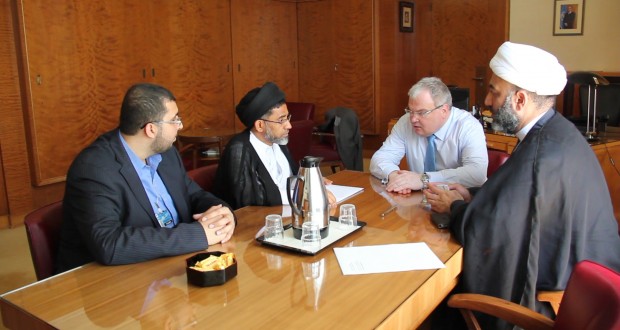Sayed Majeed Mesha’al announced a petition of 282 Bahraini religious figures to Ban Ki Moon, concerning the dissolution of the Islamic Council of Scholars, of which he is the President.
Speaking during a side event at the 26th Session of the Human Rights Council in Geneva, Mesha’al said the decision to dissolve the Council has removed the right of thousands of Bahrainis access to Shi’ite teachings. This is despite Shi’ites making up the majority of the Bahraini population. He announced that he led a delegation to the Geneva Office of the UN Secretary-General to deliver the petition that urges Ban Ki Moon to call on Bahrain to reverse the decision to dissolve the Council. Signatories include Sheikh Issa Qassim and Sayed Abdullah Al-Ghuraifi, both senior Shi’ite Bahraini clerics.
Mesha’al described the dissolution as a “clear sectarian act”, outlining a series of other actions committed by the Government of Bahrain as part of its sectarian agenda. This includes the stripping of citizenships such as that of Sheikh Hussain Najati, demolishing of mosques and religious centres, whilst denying the construction of new buildings, the incitement of sectarian hatred and other such acts that restrict religious freedom in Bahrain.
The side event, at the end of the first week of the Human Rights Council and hosted jointly by the Khiam Rehabilitation Centre for Victims of Torture (KRC) and the Bahrain Human Rights Observatory (BHRO), covered the wide range of human rights abuses in Bahrain.
Ahmed Omar, founding member of the International Centre for Supporting Rights and Freedom, told the side event of the crimes committed by the Government of Bahrain against children. He said that Bahrain fails in its duties to respect international treaties that guarantee the rights of children, by detaining and arresting them and in some cases even causing deaths with the use of excessive force.
Baqer Darwish, a member of BHRO, echoed these sentiments giving further examples of Bahrain going against its obligations both locally and internationally. He called on Bahrain to sign up to the Rome Statute of the International Criminal Court, in order to allow accountability against those in the government and security services guilty of rights violations. He said that the failure to do so thus far is an indication of how Bahrain is not serious in respecting human rights.
Jawad Fairooz, a resigned Bahraini MP from Al Wefaq National Islamic Society, also spoke during the event, introducing a report from “Bahrain Salam for Human Rights”, regarding the revoking of citizenships in Bahrain. In November 2012 Fairooz was one of thirty-one who were targeted by the government of Bahrain with the removal of their citizenships. Fairooz described the negative affects of such a decision, that deprives individuals of many rights including healthcare, work and to be represented legally.
Michael Payne, from Americans for Democracy and Human Rights in Bahrain, gave an international perspective on the situation in Bahrain, urging further action by the Human Rights Council to pressure Bahrain into respecting human rights. He thanked those 47 states who signed the joint-statement that described Bahrain as “an issue of serious concern” and reiterated the strength of the Council to hold Bahrain to account.
At the end of the first week of the Human Rights Council, Bahrain has been a hot topic, with two side events, a joint statement and other mentions throughout the council. Sheikh Maytham Salman, from the delegation, said, “I am very happy with the competency level of Bahraini human rights organisations in dealing with human rights violations in accordance with UN mechanisms and international protocols.”
/129

